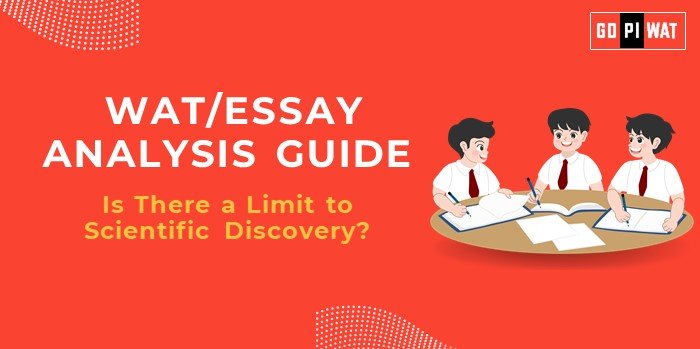📋 WAT/Essay Analysis Guide: Is There a Limit to Scientific Discovery?
🌐 Understanding the Topic’s Importance
Scientific discovery serves as a cornerstone of progress, driving advancements across industries, economies, and societies. This topic invites critical reflection on the boundaries of human inquiry, ethical responsibilities, and the implications of potential limits on scientific progress for different sectors.
📝 Effective Planning and Writing
- Time Allocation:
- ⏱️ Planning: 5 minutes
- ✍️ Writing: 20 minutes
- 🔍 Review: 5 minutes
- Preparation Tips: Research statistics, current developments, and key ethical debates in AI, genetics, and quantum mechanics.
💡 Introduction Techniques for Essays
- Historical Evolution: “From Newton’s laws to quantum mechanics, science has redefined human understanding, yet some questions about existence and consciousness remain.”
- Contrast Approach: “While science explains galaxies and genes, certain questions about consciousness and infinity persist, suggesting possible boundaries to knowledge.”
- Solution-Based Approach: “New technologies like AI and quantum computing hold potential to push scientific boundaries further than we once imagined.”
📊 Structuring the Essay Body
- Achievements:
- ✨ Major breakthroughs like AlphaFold in AI, CRISPR in genetics, and gravitational waves in physics demonstrate the continuous expansion of scientific frontiers.
- Challenges with Comparative Analysis:
- ⚖️ Ethical concerns (e.g., genetic engineering), financial barriers in high-energy physics, and philosophical questions on human cognition.
- Future Outlook:
- 🤖 AI’s potential to extend human cognition, ongoing debates over ethical limits, and the need for collaborative, cross-disciplinary research.
🎯 Concluding Effectively
- Balanced Perspective: “Science has achieved remarkable feats, but ethical and cognitive limits remind us that some mysteries may remain unsolved.”
- Future-Focused Conclusion: “While scientific progress may encounter boundaries, responsible innovation and cross-disciplinary collaboration offer paths forward.”
📌 Analyzing Successes and Shortcomings
Key Achievements: AI’s transformative impact, genetic advancements, and successes in space exploration.
Ongoing Challenges: Ethical debates in genetics, funding constraints, and human cognitive limitations.
Global Context: Differences in ethical and regulatory standards across countries highlight diverse approaches to scientific progress.
🔧 Recommendations for Sustainable Progress
- ⚖️ Regulatory Oversight: Ethical oversight bodies should ensure responsible exploration in AI and genetics.
- 💰 Resource Allocation: Focus on both fundamental and applied research, fostering a balance between breakthrough and foundational science.
- 🤝 Public Engagement: Enhance transparency and engage the public on ethical implications to maintain trust in scientific progress.
📝 Sample Short Essays
- Balanced Perspective: “Science offers vast potential, but limits in cognition and ethics suggest a horizon to discovery.”
- Solution-Oriented: “AI and collaboration could push science beyond cognitive limits, though ethical guidelines are essential.”
- Global Comparison: “Countries like the U.S. and China approach scientific exploration with varying ethical boundaries, illustrating both potential and limitations.”


